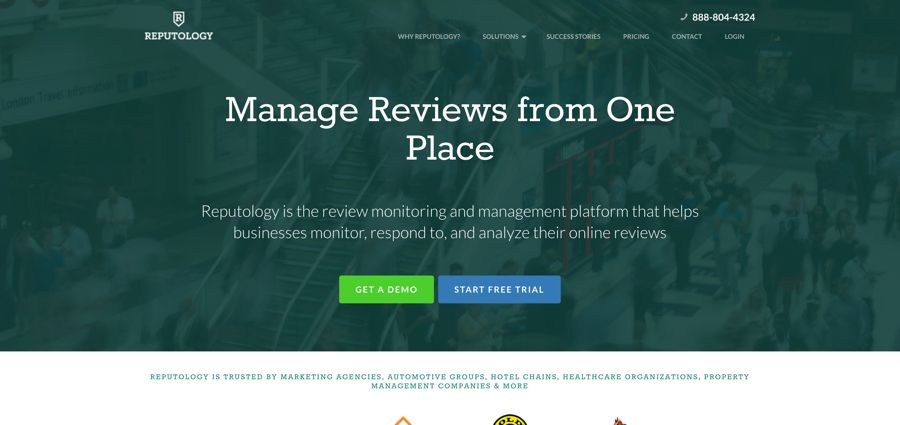并不是所有早已企业依赖local word of mouth and advertising in traditional media to attract new customers. They could get by with some degree of sloppy service and poor customer relations if it didn’t hit the national media. And even then, today’s news soon became tomorrow’s fish and chip wrappings. You had to provide seriously poor bad before you gained a reputation and being a firm to avoid. Most people just complained to the nearest free ear and left happy if that person could somehow reduce their problem.
The internet and social media have changed everything, however. People talk about nearly every business online. They leave reviews, particularly when they’re upset, and others take great credence in these online reviews. They also give blunt opinions on social media and depending on the reach of their account, this may influence the buying decisions of many people.
Online Reputation Management
Everybody Can See all Your “Dirty Washing” Online … Virtually Forever
If you suffer a public relations disaster, reported by online media, then those posts remain live for many years. The effect of this is multiplied if a journalist on a major website or new site reports your public relations disaster. Unless you act decisively, these media reports are likely to take the top positions in Google for anybody who searches for your name.
Even your employees can affect the online reputation of your business. They might write on social media about a bad day they have had at work. Their friends may share this with others, and before long thousands of people know that one of your workers had a bad day, perhaps because of an “unfair” supervisor.
Anybody who searches your company name can find a vast quantity of information relating to you. These include potential customers, possible employees, investors, and even the IRS and other government departments.
It can be a significant task to monitor the online reputation of a firm (or even a person). However, it is critical that you engage in online reputation management regularly, preferably starting before anyone uploads something nasty about you online.
For effective online reputation management to occur, you need to delegate somebody the task of managing your online reputation.
You also shouldn’t leave things too long. I was once tasked with trying to improve the reputation of a nationwide deliverer and assembler of fitness and leisure products. People bought products online (usually leaving positive reviews for the manufacturers and retailers). However, they had left page after page of negative reviews and comments about the assembly firm. While management changed (and presumably fixed the main areas of concern), it was almost impossible to carry out online reputation management with that firm’s current brand name. They had not bothered to monitor their online reputation for years and had years’ worth of negative comments and reviews to fight.
What is Online Reputation Management?
As the name suggests, online reputation management involves having somebody actively manage the perception of your brand online. Your primary goal is to improve public sentiment towards your brand and to encourage people to say positive things in their online activities.
It’s important to remember that online reputation management can be tricky. You have no say about how people perceive you online. They can write what they like. Even if they write things you consider defamatory, it can be almost impossible to delete such references. It Is far simpler to bury them, instead.
But just as other people can potentially reach millions with their damning review of your product or service, you can likewise reach a large audience in your efforts to mitigate any fallout.
Important Online Reputation Statistics
In 2017, Ryan Erskine in Forbes collated20 Online Reputation Statistics That Every Business Owner Needs To Know。Some of the most relevant ones, which emphasize the importance of online reputation management include:
- 90% of consumers read online reviews before visiting a business
- Online reviews have been shown to impact 67.7% of purchasing decisions
- 84% of people trust online reviews as much as a personal recommendation
- Every one-star increase in a Yelp rating means a 5 to 9% increase in revenue
- 65 percent of people see online search as the most trusted source of information about people and companies
- Businesses risk losing 22% of business when potential customers find one negative article on the first page of their search results. This number increases with each negative article, and with four or more negative results you are likely to risk losing 44% of potential customers
- 93% of searchers never go past the first page (which is what makes online reputation management achievable)
Without a doubt, people take great credence in what they see online. It is lucky that most people don’t dig too deeply into their research, however.
Why Should You Manage Your Online Reputation?
Makes it Easier to Acquire New Customers
As Forbes’ figures show, if people have a choice, they will usually opt for the business with the best online reputation. Anything you can do to improve your online reputation should increase your likelihood of attracting new customers.
Helps Improve Your Customer Support
Social listening enables you to find situations where people need support. You may feel that your official support channels are enough, but most people talk about their purchases in other informal ways. They may ask questions on social media pages or industry help forums. They make informal complaints about your service in these places too. Often, you could easily solve their complaint if you just knew about it.
If you are proactive and react to mentions before somebody officially asks you for assistance, it makes you look good, both in the eyes of the person you help, and anybody else reading those posts.
Retains Loyal Current Customers
The same logic applies to your existing customers. If you participate in their online conversations and provide relevant help and assistance, this can only build their trust in you and help them become brand advocates.
This works for happy customers as much dissatisfied ones. If they pay you a compliment on some website, and you see their praises and engage with them, they will be happy and pleased with your unexpected communication.
Gives Opportunities to Build Relationships with Publishers and Influencers
Some of the people who talk about your brand may have huge audiences. They may be influencers or even publishers. Undoubtedly these people can significantly affect others’ opinions, so it is particularly important to you that they gain positive images of your brand.
If you can build up positive relationships with influencers, journalists, reviewers, and other such people, you will receive increased PR opportunities to make your brand look favorable to a wide audience.
头势cial Media Crises
Vast numbers of people now have access to social media. According to We Are Social and Hootsuite’s2018年全球概览报告, the world’s total population is 7.593 billion. Of these, 4.021 billion are internet users, with 3.196 million (42% of the world’s population), active social media users. If you were a large enough brand, performing poorly around the globe, you could have more than 3 billion people complaining about you on their social accounts.
The last thing that any brand wants is a negative viral reaction about them. Imagine Pepsi’s horror, when people started criticizingKendall Jenner’s Pepsi ad, or when Adidas tweeted to its followers in 2013, “Congrats, you survived the Boston Marathon!”, straight after bombs killed three people near the marathon’s finish.
Of course, most potential problems for a brand online aren’t as big as these. Ideally, you should monitor the leading social networks for brand mentions and react before a complaint becomes a viral post. Many of the social monitoring apps include sentiment analysis, making it easier for you to spot negative comments about your brand quickly.
Shows That You Can React Well to a Bad Situation
People take great interest in how brands react to a potential problem. The last thing you want to do is to try and suppress bad news or criticism. It merely makes you look guilty and have something to hide.
You will gain nothing from abusing people online, either, even if you feel you are in the right.
Likewise, people will look at an online silence as being a sign of guilt. You always need to keep communications lines open. This is just as relevant for an offline crisis. You may be experiencing problem beyond your control, but it is vital that you keep customers in the loop.
For example, Twitter suspended Manage Flitter’s Twitter API access, without notice in late January. This effectively meant that Manage Flitter could not offer their usual services to their clients and closed them down until they could find a resolution. One problem they had was that Twitter never told them what they did wrong; they have had to guess what has upset Twitter. Throughout this process, Manage Flitter has sent regular emails to its clients, keeping them up-to-date with where things stand. They have even included their CEO’s email address in recent emails. Although Manage Flitter has yet to solve their problem entirely, they are making progress, and have certainly helped their reputation with their customers thanks to the regular emails keeping people up-to-date.
Types of Software to Help Your Online Reputation Management
You will find some examples of online reputation management software covered in our article,10 Leading Online Reputation Management Tools For 2019(which predominantly excludes social listening software).
Social Media Listening Software

Social media software is probably the most essential part of online reputation management. We looked specifically at these tools in the2019年的15个社交媒体听力工具。您使用社交媒体聆听工具来在线发现有关您的对话。他们强调了那些未被@TAG的对话,否则您会错过的对话。
The better tools also include sentiment analysis, which gives you an indication of whether each mention is positive, negative or neutral. You obviously need to keep a close eye out for negative social mentions and try to resolve any concerns.
Review Management

Online reviews can be severely critical to any business’ online success. Over time, people have left reviews in a multitude of places, which can make it difficult for you to find every review.
These tools help you find reviews. Some of them also help you to actively solicit positive reviews, telling everybody how enjoyable their experiences have been with your product or service.
Social Media Advocacy

As we have seen, social media plays a dominant role in either promoting or downgrading a firm’s online reputation. You can use social media advocacy software to give a helping hand. It can be advantageous to work with people who will advocate on your behalf, for example, your happy customers and employees. We have previously written about 8Employee Advocacy Social Media Tools Employers Should Check Out.
Your employees and customers are the most knowledgeable people about your company’s products. They’re also often the most enthusiastic about your products and are usually the best qualified to answer questions about them. It makes sense you use this knowledge and enthusiasm to advocate on your behalf on social media.
SEO Monitoring Software
As we saw above, most people search for brands online, but few go beyond the first page of Google results. The better your SEO skills, the more likely that you can control your mentions that rank near the top of Google search results.
You can use SEO monitoring software to discover the terms you rank for, as well as the specific webpages that rank. You then use your SEO software to improve the performance of pages over which you have control, for example, your company website, LinkedIn page, and Facebook page. You sue the software to ensure each page is technically correct, and you can build up links from high-ranking sites. This can be a slow job, but ultimately you can use SEO to hide your worst search results, in turn promoting better references.




